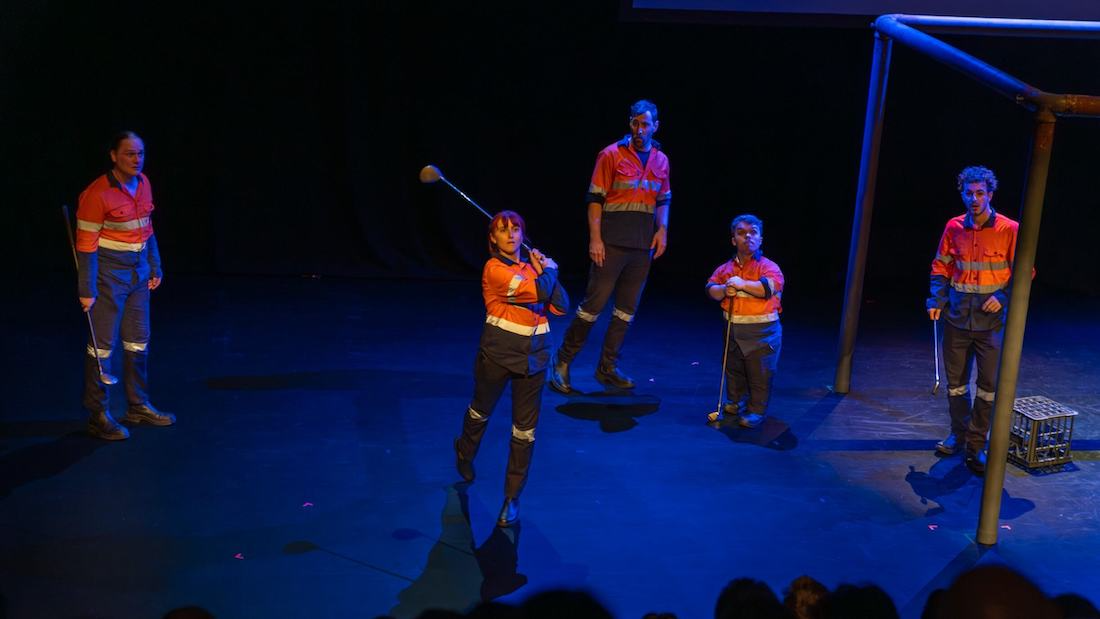
Review: FIFO at State Theatre Centre of WA
FIFO at Studio Underground at State Theatre Centre of WA
Friday, February 2, 2024
FIFO opened to a full house at the Studio Underground at the State Theatre Centre of WA on Friday as a part of the popular State of Play series.
Inspired by true events, the drama-comedy production followed the stories of five ‘fly-in, fly-out’ workers who, in working the swing together, find themselves irreversibly entangled in each other’s lives as divisions between home and work, integrity and necessity become indistinguishably blurred.
A topic very close to the hearts, or at least consciousness, of many Western Australians, almost all of whom are guaranteed to know a FIFO worker themselves, the play unfolds in a gripping and bold critique of the power structures that dominate the mining industry. Exploring serious themes including gendered sexual assault, homophobia, discrimination, mental health and isolation, FIFO eloquently grounds its industrial critique by revealing each issue through the personal lens of its characters and their complex lived experiences.
Despite the intensity of several of its themes, FIFO is indisputably a comedy. From its first scene, featuring a sardonic mining recruitment video that almost physically hurt in its hilarious accuracy, the show delivers genuine laugh-out-loud moments of industry-critical satire, as well as excellently delivered one-liners and entertaining moments of character interaction. Lightening the mood throughout the piece, audiences are lulled into lighthearted banter and shenanigans, which work to cushion but also intensify the severity of the more intense moments of the show, creating a rollercoaster of emotion.
The sense of ensemble throughout the piece was one of the biggest highlights. Comprising St John Cowcher, Jono Battista, Tamara Creasey, Jordan Valentini and Tristan McInnes, the cast was convincingly that of a motley crew brought together under unique working circumstances and struggling to deal with it.
St John Cowcher’s performance as a struggling father torn between anxiety and anger as he watches the disintegration of his relationship from afar was highly poignant, reversing the traditional gaze usually fixed on the non-FIFO spouse. The show’s exploration of male mental health crises and critique of the toxic culture of suffering in silence was achieved in large part by Cowcher’s compelling performance.
Jono Battista was fantastic as the jaded but kind, experienced colleague with a knack for seeing what the others are hiding. Beginning the role with gentleness and compassion for the show’s other characters, Jono’s gradual unfurling of a barely disguised fury and disenfranchisement was perfectly executed.
Tamara Creasey was compelling as the new recruit-come-desperate-vigilante, navigating the often abusive and corrupt industry. Through her eyes, the audience is invited to discover the latent misogyny of the workplace. However, in addition to adding nuance to the plot, it is also through her character that the audience comes to discover the complexity of the other characters, challenging stereotypes of the archetypal FIFO worker. Creasey’s performance was well sustained and multifaceted throughout, particularly in her delivery of the poignant ending scene, which arguably had one of the biggest impacts of the show.
Jordan Valentini’s role as the sincere and endearing but ultimately lost and uncertain apprentice was a source of great entertainment, often setting up many of the jokes in the show and lightening the plot in moments of intensity. While risking the accidental slip into a two-dimensional ‘comedic relief’ character, Valentini was able to instead portray someone whose happy-go-lucky attitude was consistently tempered by a slightly repressed anxiety, which gave the role an important third dimension.
Tristan McInnes’ role as the friendly but ambitious co-worker-come-supervisor was particularly interesting to watch. The tragic optimism of wanting to change a corrupt system from within is certainly painfully relevant, and it was particularly poignant that McInnes’ character, who identified themselves as homosexual, was grotesquely rendered as a quasi-villain at the play’s climax, representing the inability of anyone to be inherently good in a corrupt environment. McInnes’ multifaceted portrayal of desperation, tragic ambition and a deep, pervasive sense of loneliness was phenomenal.
Directed by Mark McDonald, the play also deserves commendation for its well-timed pacing and tidy execution. The creation of visually intriguing moments of physical theatre throughout the piece and artistic multi-uses of props such as torches effectively brought dynamism to the otherwise empty stage. Watching the cast construct the small piece of set throughout the duration of the play made for several great moments of ensemble-based play, in addition to clever story telling.
Fans of intelligent and witty theatre with something bold to say will certainly enjoy FIFO.
BEC WELDON
Photo by Keef Hickey
